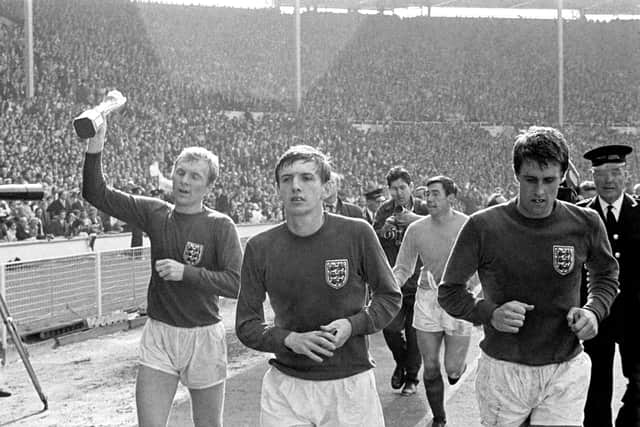Should heading be banned? Special report on football’s new guidelines


When, in January 2016, an event was held to mark the 50th anniversary of England’s 4-2 victory over West Germany, Nobby Stiles, Ray Wilson and Jack Charlton were too ill to attend. Martin Peters was there, but struggling.
Shortly before Christmas, Peters died of dementia, which claimed former Huddersfield Town full-back Wilson 18 months earlier. Stiles suffers, too, while Leeds United legend Charlton has had memory loss for years.
Advertisement
Hide AdAdvertisement
Hide AdWhen Jeff Astle, a member of the 1970 World Cup squad, died of chronic traumatic encephalopathy in 2002 the coroner classed it as an “industrial disease” partly caused by heading heavy footballs.


Last year, a University of Glasgow study, funded by the Football Association and the players’ union, the Professional Footballers’ Association, found former professionals had an approximately three-and-a-half-times higher rate of neurodegenerative disease than expected and a five-fold increase in risk of Alzheimer’s Disease.
It is an increasingly obvious problem football has seemed unwilling to confront, perhaps partly because it is unsure of how to do it, partly because of a resistance to change which leads to experts receiving hate mail.
Last week, in conjunction with their colleagues in Scotland and Northern Ireland, the FA issued guidelines to coaches of children up to the age of 18.
Advertisement
Hide AdAdvertisement
Hide AdDr Michael Grey, the University of East Anglia’s school of health sciences – who is heading up a £1m study, SCORES, to better understand cognitive health in former players – is pleased progress is being made, but frustrated it is so tentative.


“They basically deflected the responsibility and put the onus on coaches,” he says. “We’re seeing reports of a ban (on heading) but they’re guidelines and heading is still allowed in games.”
The guidelines are designed to phase in heading as bodies develop. Primary school children are advised not to head the ball in training, with the amount of practice increasing as they go through the secondary-school age groups. It is recommended balls are inflated to the lowest pressure allowed in heading drills, and there is age-specific guidance on ball sizes. The FA says heading in youth matches is rare, and certainly English football is played far more on the grass and with lighter balls than in 1966.
Addressing the problem in a rigid way is one of the things Dr Grey is uncomfortable with.
Advertisement
Hide AdAdvertisement
Hide Ad“If there’s something good in the guidelines, it’s that they’re phasing heading in,” he says. “I have lots of colleagues who say it hasn’t gone far enough but it’s a step in the right direction.


“Chronological age is probably not the way we should look at it, we should look at physical age. We have problems, more so in rugby, when we match people on age. It should be more on stature but I know full well that has its difficulties.”
Another issue is there is not much research to go on, particularly for women.
“The FA has taken a cautious approach to reduce a perceived risk to young people and that is entirely understandable,” says Fiona Carragher, the Alzheimer’s Society’s chief policy and research officer. “However, we do not know for sure how real this risk is as more detailed research is needed. Retired professional footballers are at increased risk of dementia, but research hasn’t yet shown why this is the case or told us about amateur football.”
Advertisement
Hide AdAdvertisement
Hide AdAs a former PE teacher, Huddersfield Town assistant manager Nicky Cowley thinks teaching children to head properly is vital.
“Heading’s such an important skill and it is a real shame you have to be so careful about coaching it,” he says.
“I completely understand health and safety comes a long way before developing a skill and if the necessary research has taken place, that has to be respected. But the technique of heading is very important and at grassroots level it needs to be coached in the right way.
“Having been a PE teacher, I always think of the children’s safety when they’re involved in contact sports. In sports like rugby it’s important they’ve got head equipment to protect such a vital organ. The FA are taking steps with caution and I think that’s correct.
Advertisement
Hide AdAdvertisement
Hide Ad“Once players have the confidence and technique to head the ball in a safe way, getting the right dose of that during the week when they’re older is the way to move the game forward.
“If a player wants to stay out at the end of a training session and head so many balls they can put themselves in danger. It’s not only the players you have to protect, but the coaches.
“Quite often it’s the distance, too. If you serve a ball from a great distance at high speed it shakes the brain a lot but if you’re much closer and the player heads the ball with the right part of the head over a much safer distance, that looks much healthier.”
Cowley played non-league football into his 30s, and says: “Never really having thought about the dangers as a young person, it’s quite shocking when you find it can be so dangerous to somebody’s health in the future. I’m pleased steps are being made but it’s maybe not been thought about enough in the past.”
Advertisement
Hide AdAdvertisement
Hide AdRestrictions are tighter in the more litigious USA. In August, 2014 a group of parents and players filed a class-action lawsuit in California charging FIFA, US Soccer and the American Youth Soccer Organisation with negligence in treating and monitoring head injuries. US Soccer had to act.
Players 10 years old or younger cannot be taught to head, and doing it in a game is an indirect free-kick. Goalkeepers are not allowed to lift the ball over a “build-out line” midway between the penalty area and halfway line, and 11 and 12-year-olds can only do 30 minutes’ heading training per week. It is allowed in matches in some states, but not others, meaning top teams play to different rules week to week.
Dr Grey supports measures to keep the ball on the ground at youth level but cautions: “We can’t get too caught up in the hysteria over there about protecting kids. It’s really important we get people playing sport because the obesity epidemic in this country is staggering.”
He is scathing about the response from the FA and PFA since Astle’s death.
Advertisement
Hide AdAdvertisement
Hide Ad“They have done the bare minimum in terms of research,” he says. “They’re not supporting the Scores project whatsoever.
“When you look at players’ salaries, the cost of research isn’t even a drop in the bucket. Look at the money they’re putting into VAR and compare that to player health and wellbeing.”
Even if it means upsetting those who fear the game will be changed forever, as it is by VAR, he believes more is needed.
“It’s definitely a well-meaning step in the right direction but I think they’ve missed the mark a bit,” Dr Grey reflects.
Advertisement
Hide AdAdvertisement
Hide Ad“We’ve come a long, long way. Five or six years ago we wouldn’t even be having this conversation. Full credit to the FA for that, but there’s still a lot of resistance.
“There was a massive social media backlash to these guidelines from people who think they are changing the game. Because of comments like that – and there are lots – we are not making as much progress as we should. I get hate mail.
“We may get to the stage where we can ban heading at senior level but we need more evidence before that happens. I’m never in favour of the word ban, we just need to reduce the exposure.
“If heading went out of the game altogether I would be happy but I don’t think we’ve got to do that right now.”
Comment Guidelines
National World encourages reader discussion on our stories. User feedback, insights and back-and-forth exchanges add a rich layer of context to reporting. Please review our Community Guidelines before commenting.